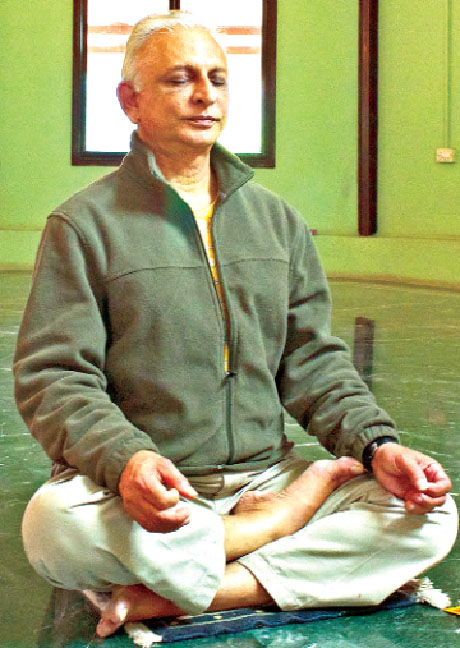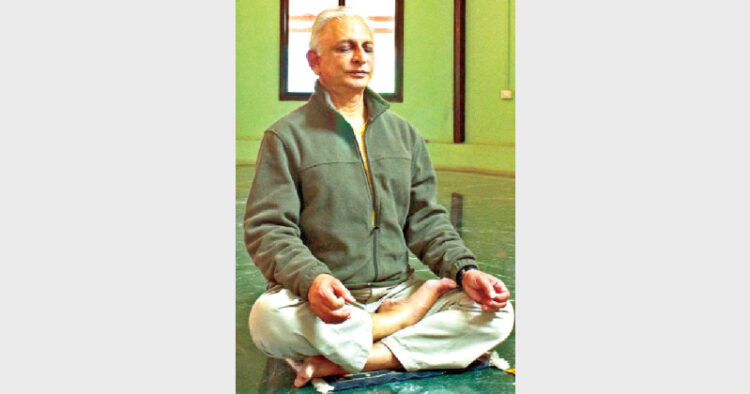 Born as Mumtaz Ali Khan in Kerala, his life journey of becoming Sri M was full of wonders and miracles that have marvelled lakhs of his readers and followers. He has successfully completed his padayatra, Walk of Hope, for peace and harmony from Kanyakumari to Kashmir. The author of Apprenticed to A Himalayan Master and famous preacher of Kriya Yoga spoke to Ganesh Krishnan R in the bacjdrop of International Yoga Day. Excerpts:
Born as Mumtaz Ali Khan in Kerala, his life journey of becoming Sri M was full of wonders and miracles that have marvelled lakhs of his readers and followers. He has successfully completed his padayatra, Walk of Hope, for peace and harmony from Kanyakumari to Kashmir. The author of Apprenticed to A Himalayan Master and famous preacher of Kriya Yoga spoke to Ganesh Krishnan R in the bacjdrop of International Yoga Day. Excerpts:
How did you embark on the idea of Walk of Hope, covering 7500 km from Kanyakumari to Kashmir in 474 days?
Since the time immemorial people who wanted to spread their ideas actively and seriously, chose to walk across the length and breadth of the country. Adi Sankaracharya walked from Kerala to Badrinath-Kedarnath. Gurunanak has walked five times as much as I have walked. Not too far from our lifetime, Swami Vivekananda walked into so many places in India, from North to South and South to North. They all walked because walking has a very special significance. So we had decided that we will walk for Manav Ekata. It is the ancient philosophy of the Hindu Culture that we don’t want to learn anything from anybody. The inspiration behind choosing Kanyakumari was it is the Sangam of three oceans. And it was flagged off on the Birth Anniversary of Swami Vivekananda.
Do you think your message of social harmony has successfully been delivered?
I think we have managed to sow the seeds of the philosophy of Vedic concept, “Ekam Sat Viprah Bahudha Vadanti”—Truth is one, the wise call it by many names. We have planted the seeds in about 25 lakh people on the way we walked down. We have created local bodies that can nourish and look after it. Then it will become strong enough to withstand all oppositions. And another thing I must tell you in this context is, I am 68 years old. But there were people of half my age who wanted to run to keep pace with me.
Do you think it was because of the power of Yoga and Pranayama?
Yes, it is actually the energy of Yoga. Since the age of ten till today I have not missed my Yoga even a single morning. Yogasanas, Pranayamas and the Kriya Yoga, I have inherited from my lineage, not only keep the body healthy and young, also keep your mind healthy and young.
Is Kriya Yoga different from other streams of Yoga? Please enlighten our readers.
When you say Kriya, it means practical techniques or methods. Performing some action, that is the meaning of Kriya. According to the Yoga Science, there are 1008 Kriyas. Out of which a few Kriyas have been selected or practised by great Gurus. Some yogis have interpreted it in different ways. Thus, different Kriyas were developed. So when I say Kriya Yoga, it means a particular method that has come done to us from the great Yogi called Sri Guru Babaji. I brought it from Maheshwarnath Babaji, the disciple of Sri Guru Babaji. It is also the method practised by the Nath Sambradaya— of Adi Nath, Mahendra Nath, Gorakh Nath and so on. It contains particular kind of Pranayamas that you cannot find in any kind of books. It is preferred that you should be a vegetarian and follow the Yama-Niyamas. For example, you should not consume any alcohol. In fact, once you start practising it, you will not be interested in all such things like alcohol. Because you derive enough happiness out of Kriya.
In your autobiography, you said that your father was also a lifelong practitioner of Yoga.
He practised yoga and he picked it up from Kalari (traditional Kerala martial arts training centre). He wanted to practise yoga for good health. When he took Yoga as a practice, he went to one Sharmaji who used to teach Yoga in Travancore Palace. When I was ten years old, Sharmaji taught me also the lessons of Yoga. After several years, when I met Babaji in Himalaya, he taught me Kriya Yoga and some other special techniques of Yoga. My father practised Yoga all his life. In the beginning, he gave up his smoking. And gradually, he became a pure vegetarian. And his health was perfectly alright till the age of 88, when he peacefully breathed his last.
Prime Minister Modi in US said that Yoga has its roots in India but we don’t want to claim any IPR (Intellectual Property Right) on it. How do you observe his statement?
Our Prime Minister himself is a practitioner of Yoga. He derives the benefit out of it. So it is natural to say that we don’t want any patent on Yoga. Because the moment you take a patent on something, people will be discouraged from taking it. If we claim any patent on Yoga, it will be like going against the open-mindedness of Indian culture. We don’t want to say that it belongs to us only. It is in this land where people said, you have to be happy and I have to be happy. It didn’t confine happiness into a geographical boundary. What is the prayer that used to be chanted in an RSS Sakha? It is “Sarve Bhavantu Sukhinah! Sarve Santu Niramaya!” What does it mean? May the whole world be happy! It is the Indian culture. And we pray “Lokah Samastah Sukhino Bhavantu”— May all beings everywhere be happy. Yes, Yoga can give Sukh (happiness) for all! So I agree with the Prime Minister.
The question may not be ‘spiritually correct’, but our readers will like to know about the transformation from Mumtaz Ali Khan to Madhukar Nath.
I was born Mumtaz Ali Khan. Our ancestors were immigrants came from across the border. When I reached Standard X, I dropped the surname Khan because it sounded a bit odd. I have not changed my name because it is an unnecessary headache. You have to publish it in Gazette and all that. In my passport, it is still Mumtaz Ali. But when I met my Guru Maheshwarnath Babaji in Himalaya and took the Diksha of Nath Sampradaya, He gave me the name Madhukar Nath. I love that name because he used to call me Madhu. You know, Madhu means honey. And therefore, when people call me ‘M’, I am very happy because it doesn’t have any religious connotation. It simply means that I am a Manushya. There are some religions which instruct people to follow strict rules. I don’t subscribe to that idea.
What role can Yoga play in the present chaotic social circumstances of our world?
Yoga can play a tremendous role in this present situation. Firstly, we need not to be spiritually inclined. Yoga can help one to have good health, to bring about control over anger, hatred and feelings like that. Because once you practise yoga regularly, the mind will become calm and quiet. The very definition of Yoga is, ‘Chitha Vrithi Nirodha’, that means the stopping of the disturbing and distracting vibrations of mind. Even though ideological reasons are given, I think, mostly people are violent because it comes out of the man’s poor capacity to control anger and hatred. And Yoga which is stressed on peace, goodness and tranquillity can go a long way in creating human beings who are creative rather than destructive. And I think it will be a good idea if we introduce Yoga in schools and colleges.
For most of our readers, it will be a surprise to know you had once associated with Organiser Weekly. How do you recall your Organiser days?
I used to work with Nanaji Deshmukh in Jhandewalan extension which is very close to the office of Organiser. And the then Editor of Organiser was Shri KR Malkani. He was a very good friend of mine. And Shri R Balashankar was the Sub-Editor. I used to go there and write for Organiser. One of the first articles I wrote for Organiser was Why I Call Myself a Hindu?.
You have cherished good personal relationships with many RSS leaders. How do you remember them? What are your views on RSS?
Nanaji was an extraordinary man. Of course, as you know, he was a very senior pracharak of RSS and a great Jana Sangh leader. He was a man who had a wide circle of friends cutting across political barriers. After realising that politics was not his cup of tea, he resigned from politics and started his works in Chitrakoot where he did a lot of work in co-operative agriculture. I think he was the first person to do such an experiment in India. I have very good relationships with many of the RSS leaders like Bhaiyyaji, Mohanji etc. Some of them are very good friends of mine. About RSS, one thing I have mentioned in my book that, whether you believe in their ideology or not, they are totally patriotic and they can never be a part of something which is against the nation. This is 101 percent sure. And if they see somebody is seriously interested in Indian culture, they support that person, whatever the religion or creed he belongs to. This is my understanding of RSS.














Comments